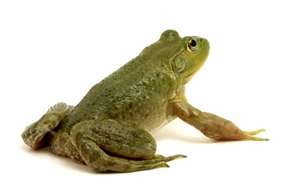The Frog: Greater than Dovid, and The Birth of Perek Shirah
by Rabbi Mordechai Rhine
The plagues had finally begun. First it was blood, then it was frogs. G-d was finally bringing retribution on the Egyptians.
Interestingly, the Midrash tells us regarding the frogs that they went literally everywhere. They even went into the ovens as the dough was baking. By entering the ovens the frogs could expect to die. Yet, the frogs excelled in their efforts to afflict the Egyptians and even jumped into the ovens while they were lit.
Our sages tell us that when King Dovid completed Tehillim he was a bit proud of himself. In Tehillim he had captured his life experiences and how he managed to communicate with G-d in both happiness and challenge. But when King Dovid encountered the frog, “It slapped him and said, ‘My praise is greater than yours.’” In what way is the frog’s song greater than Dovid’s? And what is the meaning of Dovid’s encounter with the frog?
Dovid’s life was a certainly a challenging one. But remarkably, Dovid always came out on top. There are many others who, like Dovid, served G-d with utmost dedication, but because of circumstances did not seem to “come out on top” despite their righteousness. The frog represents those who serve G-d loyally but do not necessarily end up on top, in this world. They may actually fall in the line of duty. On their lives it is not written, “And they lived happily ever after.”
The frog’s message to Dovid is that as great as Dovid is, his life can only represent a certain dimension of service and song. Others make their contribution as well.
The fact that Dovid had a dialogue with the frog doesn’t mean that the frog opened his mouth and verbalized. Rather, Dovid saw the frog and was reminded how the frog is known for sanctifying G-d’s Name in a way totally different than the way that Dovid sanctified G-d’s Name. Dovid had achieved greatness. In recording his growth and expressing it in Tehillim he had accomplished something momentous. But his task was not over.
As a King representing all of his subjects, and as a person living (as the Midrash tells us) on years gifted to him by First Man, Dovid felt compelled to continue his life’s work and express the song of all aspects of creation. And so was born Perek Shirah. Through lessons illustrated in various aspects of creation, Dovid would express so many more dimensions of song. From the spider, about whom Dovid wondered at one point, “Why was he created at all?” to the elephant, who is both huge but also blessed with dexterity, to the frog whose dedication and personal sacrifice is a subject in this week’s Parsha, Dovid set out to discover and record The Song of Creation itself.
Interestingly, in our Siddur we ask to merit to praise G-d “in addition to the praises of Dovid.” One wonders: Didn’t Dovid say it all? How could one praise G-d more than Dovid did?
But the answer, as the frog indicated, is that each creation praises G-d from his own unique vantage point. According to the situation that G-d puts us in, so do we fulfill our personalized mission. Our very lives sing praise to G-d in a way that is totally us. Our situation or challenges with our job, spouse, children, or community, were tailor-made by G-d for us to serve Him. Through our personal situation we sing our own personal song of life, one that only we as individuals can sing.
Despite the greatness of Dovid’s work there is still much for each of us to add. Make the effort to address the challenges and opportunities of your own life, because your makeup is uniquely you. You can and must succeed, because as the saying goes: There will never be another you.
© 2016 by TEACH613™


I just wanted to thank you for this beautiful post. I’m a big animal lover so Perek Shira means a lot to me. I didn’t even know that Dovid Hamelech wrote it. I tweeted the link to the post from my twitter account.